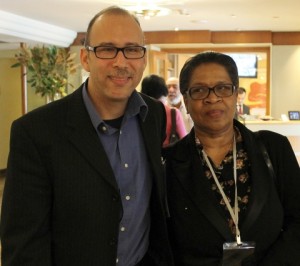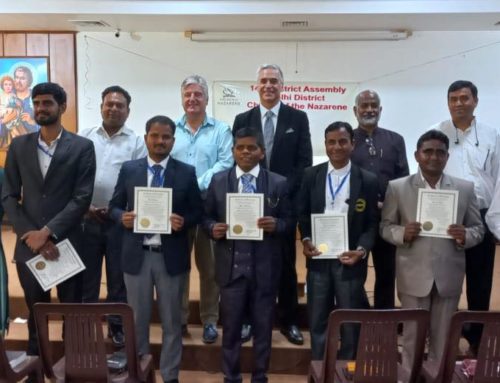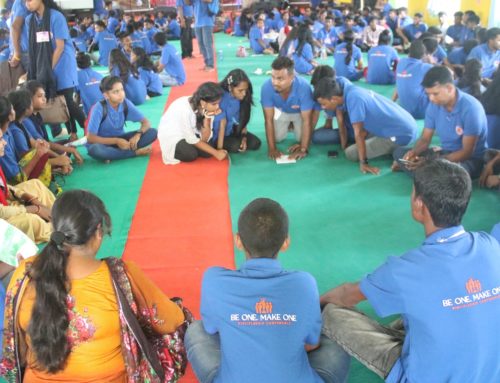 It started out in 2009 with feeding a hot, homemade meal every Thursday evening to about 100 people in need in the 18th district of Paris, France.
It started out in 2009 with feeding a hot, homemade meal every Thursday evening to about 100 people in need in the 18th district of Paris, France.
Today, the Paris food ministry has evolved from weekly hot meals to a multi-pronged ministry of compassion that is reaching people in need across the city with food, the opportunity for developing loving relationships, and now one church is even providing temporary shelter to people with nowhere to live.
The food ministry, an initiative of Nazarene Youth International (NYI) of France, is run by local Nazarene church members from several churches in Paris, along with other people in the community who have caught the vision and joined the effort. The ministry registered as an official, government-recognized association called JNI France Ministry (JNI is French for NYI), and has developed a relationship with three major grocery chains, representing 35 stores, which donate fresh produce and nonperishable food items that are near or past their expiration date.
The association distributes food six days a week in six locations, feeding an estimated 200 families.
“It’s becoming a force on the district,” said missionary Brian Ketchum. “All the churches are seeing that as a vehicle to reaching needs of people around them.”
And now the Nazarene churches in Paris are about to embark on a new, innovative outreach: a food truck, which will drive around the city and offer sandwiches, hot soup and coffee to people living on the streets.
The association received 9,000 euros to purchase a food truck that is outfitted to prepare and serve hot meals. The volunteers plan to drive around Paris looking for homeless people, and will park the truck and give out sandwiches, hot soup and coffee. The purpose is to make connections with people who can’t come to receive food packages from the distribution centers, or don’t have a home where they can prepare the food they would otherwise receive.
But it’s not just the homeless that struggle to eat.
Pastor José Monteiro, who is leading the ministry, said that the typical French family spends 250 to 400 euros a month on food. But there are many people who do not have that much money leftover for food after they pay other bills. By providing free food, the churches help families to free up some of their budget for other critical needs.
“One of the ladies came and thanked me because she said that before she knew our association, her kids used to go to school without lunch,” said Monteiro. “Most of them didn’t have their breakfast before they go to school. Now her kids can have their breakfast and they can go with a croissant to school for the recreation at 10.”
The association purchased four refrigerated trucks to pick up the food from the grocery stores. Up to thirty different association volunteers and over a hundred church members help every single day to pick up the food, deliver it to the three sites, unload it and package it for distribution. Items they give out range from fish, meat, vegetables, fruit, bread, cheese, dairy products, pasta and rice. Sometimes they are also given hygiene products, as well.
Many of the recipients are unemployed women; others are disabled or sick and unable to work. A third group are people with addictions. One distribution center attracts immigrants from Eastern Europe.
It’s a tangible expression of love for the people of Paris. And people are responding.
One woman, who claimed she was an atheist, was attracted to the vision of the ministry and joined the association as a volunteer. The churches welcomed her with open arms, but put no pressure on her, spiritually. After some time, she began to attend the Nazarene church, saying she was now agnostic. After a few months, she began to tithe regularly, Monteiro said, chuckling. “Very interesting.”
 As pastor of the Protestant Evangelical Church Of the Nazarene, a five-year-old church gathering in the 17th district of Paris, Monteiro said that 80 percent of his 30 to 40 regular attenders are helping in the association.
As pastor of the Protestant Evangelical Church Of the Nazarene, a five-year-old church gathering in the 17th district of Paris, Monteiro said that 80 percent of his 30 to 40 regular attenders are helping in the association.
“I think it’s helped them to have a different way to show their love to the people,” he said. “This is a way where they practice the perfect love in the daily Christian life.”
Keeping the ministry going sometimes involves overcoming obstacles on faith. For instance, repairing mechanical problems on the trucks is an ongoing battle, Monteiro said. Yet, God always seems to provide. Sometimes it involves creativity. At least once the ministry received items from some of the supermarkets which they were able to sell in a typical French Garage Sale to raise money for truck repairs.
Emboldened by the success of the food ministry, Monteiro’s church is expanding its work to providing shelter for people who otherwise would be living on the streets or under bridges. The JNI France Ministry has rented a two-room house for the purpose. In September they want to rent a four-room apartment to help more people.



